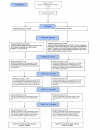Video Game Intervention for Sexual Risk Reduction in Minority Adolescents: Randomized Controlled Trial
- PMID: 28923788
- PMCID: PMC5625130
- DOI: 10.2196/jmir.8148
Video Game Intervention for Sexual Risk Reduction in Minority Adolescents: Randomized Controlled Trial
Abstract
Background: Human immunodeficiency virus (HIV) disproportionately impacts minority youth. Interventions to decrease HIV sexual risk are needed.
Objective: We hypothesized that an engaging theory-based digital health intervention in the form of an interactive video game would improve sexual health outcomes in adolescents.
Methods: Participants aged 11 to 14 years from 12 community afterschool, school, and summer programs were randomized 1:1 to play up to 16 hours of an experimental video game or control video games over 6 weeks. Assessments were conducted at 6 weeks and at 3, 6, and 12 months. Primary outcome was delay of initiation of vaginal/anal intercourse. Secondary outcomes included sexual health attitudes, knowledge, and intentions. We examined outcomes by gender and age.
Results: A total of 333 participants were randomized to play the intervention (n=166) or control games (n=167): 295 (88.6%) were racial/ethnic minorities, 177 (53.2%) were boys, and the mean age was 12.9 (1.1) years. At 12 months, for the 258 (84.6%) participants with available data, 94.6% (122/129) in the intervention group versus 95.4% (123/129) in the control group delayed initiation of intercourse (relative risk=0.99, 95% CI 0.94-1.05, P=.77). Over 12 months, the intervention group demonstrated improved sexual health attitudes overall compared to the control group (least squares means [LS means] difference 0.37, 95% CI 0.01-0.72, P=.04). This improvement was observed in boys (LS means difference 0.67, P=.008), but not girls (LS means difference 0.06, P=.81), and in younger (LS means difference 0.71, P=.005), but not older participants (LS means difference 0.03, P=.92). The intervention group also demonstrated increased sexual health knowledge overall (LS means difference 1.13, 95% CI 0.64-1.61, P<.001), in girls (LS means difference 1.16, P=.001), boys (LS means difference 1.10, P=.001), younger (LS means difference 1.18, P=.001), and older (LS means difference=1.08, P=.002) participants. There were no differences in intentions to delay the initiation of intercourse between the two groups (LS means difference 0.10, P=.56).
Conclusions: An interactive video game intervention improves sexual health attitudes and knowledge in minority adolescents for at least 12 months.
Trial registration: Clinicaltrials.gov NCT01666496; https://clinicaltrials.gov/ct2/show/NCT01666496 (Archived by WebCite at http://www.webcitation.org/6syumc9C0).
Keywords: adolescent; human immunodeficiency virus; intervention; primary prevention; randomized controlled trial; risk reduction; videogame.
©Lynn E Fiellin, Kimberly D Hieftje, Tyra M Pendergrass, Tassos C Kyriakides, Lindsay R Duncan, James D Dziura, Benjamin G Sawyer, Linda Mayes, Cindy A Crusto, Brian WC Forsyth, David A Fiellin. Originally published in the Journal of Medical Internet Research (http://www.jmir.org), 18.09.2017.
Conflict of interest statement
Conflicts of Interest: None declared.
Figures


Similar articles
-
A Smartphone Game-Based Intervention (Tumaini) to Prevent HIV Among Young Africans: Pilot Randomized Controlled Trial.JMIR Mhealth Uhealth. 2018 Aug 1;6(8):e10482. doi: 10.2196/10482. JMIR Mhealth Uhealth. 2018. PMID: 30068501 Free PMC article.
-
The design and implementation of a randomized controlled trial of a risk reduction and human immunodeficiency virus prevention videogame intervention in minority adolescents: PlayForward: Elm City Stories.Clin Trials. 2016 Aug;13(4):400-8. doi: 10.1177/1740774516637871. Epub 2016 Mar 24. Clin Trials. 2016. PMID: 27013483 Free PMC article. Clinical Trial.
-
Using Videogame Apps to Assess Gains in Adolescents' Substance Use Knowledge: New Opportunities for Evaluating Intervention Exposure and Content Mastery.J Med Internet Res. 2015 Oct 28;17(10):e245. doi: 10.2196/jmir.4377. J Med Internet Res. 2015. PMID: 26510775 Free PMC article.
-
Pilot Testing the Feasibility of a Game Intervention Aimed at Improving Help Seeking and Coping Among Sexual and Gender Minority Youth: Protocol for a Randomized Controlled Trial.JMIR Res Protoc. 2019 Feb 15;8(2):e12164. doi: 10.2196/12164. JMIR Res Protoc. 2019. PMID: 30767903 Free PMC article.
-
Effects of a Web-Based Computer-Tailored Game to Reduce Binge Drinking Among Dutch Adolescents: A Cluster Randomized Controlled Trial.J Med Internet Res. 2016 Feb 3;18(2):e29. doi: 10.2196/jmir.4708. J Med Internet Res. 2016. PMID: 26842694 Free PMC article. Clinical Trial.
Cited by
-
Development, Refinement, and Acceptability of Digital Gaming to Improve HIV Testing Among Adolescents and Young Adults at Risk for HIV.Games Health J. 2020 Feb;9(1):53-63. doi: 10.1089/g4h.2018.0162. Epub 2019 Sep 27. Games Health J. 2020. PMID: 31560218 Free PMC article.
-
A Smartphone Game-Based Intervention (Tumaini) to Prevent HIV Among Young Africans: Pilot Randomized Controlled Trial.JMIR Mhealth Uhealth. 2018 Aug 1;6(8):e10482. doi: 10.2196/10482. JMIR Mhealth Uhealth. 2018. PMID: 30068501 Free PMC article.
-
Application of Serious Games in Health Care: Scoping Review and Bibliometric Analysis.Front Public Health. 2022 Jun 10;10:896974. doi: 10.3389/fpubh.2022.896974. eCollection 2022. Front Public Health. 2022. PMID: 35757619 Free PMC article.
-
Supporting contraceptive self-care and reproductive empowerment with a digital health game in Barbados: Development and Pre-implementation study for What's My Method?Gates Open Res. 2024 Nov 21;8:47. doi: 10.12688/gatesopenres.15376.2. eCollection 2024. Gates Open Res. 2024. PMID: 39872041 Free PMC article.
-
Recommendations for the Development of HIV Prevention Interventions Among Latino Young Sexual Minority Groups.Sex Res Social Policy. 2021 Dec;18(4):992-1001. doi: 10.1007/s13178-020-00494-2. Epub 2020 Aug 26. Sex Res Social Policy. 2021. PMID: 38124992 Free PMC article.
References
-
- Centers for Disease Control and Prevention. 2015. Nov, [2016-07-20]. HIV Surveillance Report, 2014 https://www.cdc.gov/hiv/pdf/library/reports/surveillance/cdc-hiv-surveil... 6qsHNPMh2.
-
- National Conference of State Legislatures State Policies on Sex Education in Schools. National Conference of State Legislatures; May 5, 2015; Chicago, IL. 2016. Dec 21, http://www.ncsl.org/research/health/state-policies-on-sex-education-in-s...
-
- Galbraith JS, Stanton B, Boekeloo B, King W, Desmond S, Howard D, Black MM, Carey JW. Exploring implementation and fidelity of evidence-based behavioral interventions for HIV prevention: lessons learned from the focus on kids diffusion case study. Health Educ Behav. 2009 Jun;36(3):532–549. doi: 10.1177/1090198108315366. http://europepmc.org/abstract/MED/18445739 - DOI - PMC - PubMed
-
- Veniegas RC, Kao UH, Rosales R, Arellanes M. HIV prevention technology transfer: challenges and strategies in the real world. Am J Public Health. 2009 Apr;99 Suppl 1:S124–S130. doi: 10.2105/AJPH.2007.124263. http://europepmc.org/abstract/MED/19218184 - DOI - PMC - PubMed
Publication types
MeSH terms
Associated data
Grants and funding
LinkOut - more resources
Full Text Sources
Other Literature Sources
Medical

